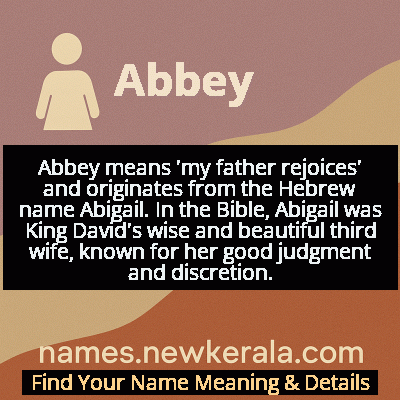Abbey Name Meaning & Details
Origin, Popularity, Numerology Analysis & Name Meaning of Abbey
Discover the origin, meaning, and cultural significance of the name ABBEY. Delve into its historical roots and explore the lasting impact it has had on communities and traditions.
Name
Abbey
Gender
Female
Origin
Hebrew
Lucky Number
8
Meaning of the Name - Abbey
Abbey means 'my father rejoices' and originates from the Hebrew name Abigail. In the Bible, Abigail was King David's wise and beautiful third wife, known for her good judgment and discretion.
Abbey - Complete Numerology Analysis
Your Numerology Number
Based on Pythagorean Numerology System
Ruling Planet
Saturn
Positive Nature
Ambitious, efficient, realistic, and authoritative.
Negative Traits
Materialistic, stressed, confrontational, and can be overly ambitious.
Lucky Colours
Dark blue, black.
Lucky Days
Saturday.
Lucky Stones
Blue sapphire, amethyst.
Harmony Numbers
2, 4, 6.
Best Suited Professions
Business leaders, managers, financial services, law enforcement.
What People Like About You
Leadership, determination, organizational skills.
Famous People Named Abbey
Abbey Lincoln
Jazz vocalist and civil rights activist
Influential jazz singer and songwriter who used her music to address civil rights issues
Abbey Lee Kershaw
Model and actress
Internationally recognized Australian model who transitioned to successful film acting
Abbey Clancy
Model and television presenter
British model who won Britain's Next Top Model and became a popular TV personality
Name Variations & International Equivalents
Click on blue names to explore their detailed meanings. Gray names with will be available soon.
Cultural & Historical Significance
Extended Personality Analysis
People named Abbey are typically characterized by their intelligence, emotional depth, and natural grace. Drawing from the biblical description of Abigail as 'good in discretion,' Abbey's often exhibit strong judgment and thoughtful decision-making abilities. They tend to be excellent communicators who listen carefully and offer wise counsel, making them valued friends and colleagues. Their emotional intelligence allows them to navigate complex social situations with ease and diplomacy. Abbey's frequently demonstrate creative talents and an appreciation for aesthetics, whether in art, music, or personal style. They balance practicality with imagination, often excelling in fields that require both analytical thinking and creative expression. While gentle in demeanor, they possess inner strength and resilience, able to handle challenges with poise and determination. Their loyalty and reliability make them trustworthy companions, and their natural elegance often makes them stand out in social settings without being ostentatious.
Modern Usage & Popularity
In modern naming practices, Abbey maintains consistent popularity as both a given name and a nickname for Abigail. While its peak usage occurred in the late 1990s and early 2000s, it remains a well-established choice that appeals to parents seeking a name with traditional roots but contemporary feel. The name ranks moderately in popularity charts, making it familiar without being overly common. Recent decades have seen Abbey used increasingly as a standalone name rather than solely as a diminutive, reflecting evolving naming trends that favor shorter, more direct names. Its usage spans various English-speaking regions, with particular strength in the United States, United Kingdom, and Australia. The name's versatility allows it to suit diverse personalities and backgrounds, from professional environments to creative circles. Continued appearances in popular culture, through celebrities like Abbey Lee and cultural references like Downton Abbey, help maintain its modern relevance and appeal to new generations of parents.
Symbolic & Spiritual Meanings
Symbolically, Abbey represents the harmonious integration of wisdom, beauty, and spiritual depth. The name carries the biblical symbolism of discretion and good judgment, embodying the idea of thoughtful action and emotional intelligence. It also symbolizes grace and aesthetic appreciation, reflecting the description of the original Abigail as 'beautiful in form.' The name's connection to religious abbeys adds layers of meaning related to sanctuary, contemplation, and spiritual peace. Abbey serves as a bridge between different realms—connecting tradition with modernity, practicality with creativity, and strength with gentleness. It symbolizes the power of quiet influence and the importance of inner beauty alongside outward grace. The name represents balance and integration, suggesting someone who can navigate multiple aspects of life with equal competence and poise. In a broader metaphorical sense, Abbey embodies the concept of sacred space within personal identity—a place of wisdom, reflection, and authentic self-expression.

